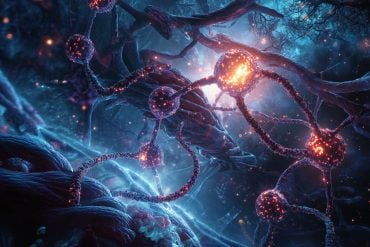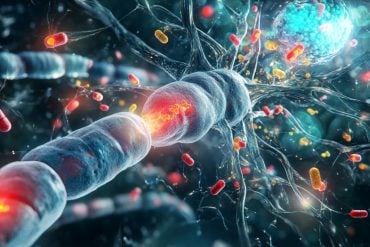Summary: Adolescents engaging in “transcendent thinking”—the practice of looking beyond the immediate context to understand deeper meanings and implications—can significantly influence their brain development. The study highlights how this complex form of thinking fosters coordination between the brain’s executive control and default mode networks, crucial for psychological functioning.
Analyzing high school students’ responses to global teen stories, researchers found that transcendent thinking not only enhances brain network coordination over time but also predicts key psychosocial outcomes in young adulthood. These groundbreaking findings underline the potential of civically minded education in supporting adolescents’ cognitive and emotional development.
Key Facts:
- Impact on Brain Networks: Transcendent thinking boosts the collaboration between the executive control and default mode networks in the brain, which are essential for focused goal-directed activities and internal reflection, respectively.
- Predictive of Developmental Milestones: Adolescents who frequently engage in transcendent thinking show greater brain network coordination growth, which is linked to positive developmental outcomes such as identity development and life satisfaction.
- Educational and Mental Health Implications: The study suggests that encouraging adolescents to explore complex perspectives and emotions can have profound effects on their brain development and overall well-being, advocating for educational approaches that promote such thinking.
Source: USC
Scientists at the USC Rossier School of Education’s Center for Affective Neuroscience, Development, Learning and Education (CANDLE), have shown for the first time that a type of thinking, that has been described for over a century as a developmental milestone of adolescence, may grow teenagers’ brains over time.
This kind of thinking, which the study’s authors call “transcendent,” moves beyond reacting to the concrete specifics of social situations to also consider the broader ethical, systems-level and personal implications at play.
Engaging in this type of thinking involves analyzing situations for their deeper meaning, historical contexts, civic significance, and/or underlying ideas.
The research team, led by USC Rossier Professor Mary Helen Immordino-Yang, includes Rebecca J.M. Gotlieb, research scientist at UCLA, and Xiao-Fei Yang, assistant research professor at USC Rossier.
The study is published in Scientific Reports.
In previous studies, the authors had shown that when teens and adults think about issues and situations in a transcendent way, many brain systems coordinate their activity, among them two major networks important for psychological functioning: the executive control network and the default mode network.
The executive control network is involved in managing focused and goal-directed thinking, while the default mode network is active during all kinds of thinking that transcends the “here and now,” such as when recalling personal experiences, imagining the future, feeling enduring emotions such as compassion, gratitude and admiration for virtue, daydreaming or thinking creatively.
The researchers privately interviewed 65, 14-18-year-old high school students about true stories of other teens from around the world and asked the students to explain how each story made them feel.
The students then underwent fMRI brain scans that day and again two years later. The researchers followed up with the participants twice more over the next three years, as they moved into their early twenties.
What the researchers found is that all teens in the experiment talked at least some about the bigger picture—what lessons they took from a particularly poignant story, or how a story may have changed their perspective on something in their own life or the lives and futures of others.
However, they found that while all of the participating teens could think transcendently, some did it far more than others. And that was what made the difference.
The more a teen grappled with the bigger picture and tried to learn from the stories, the more that teen increased the coordination between brain networks over the next two years, regardless of their IQ or their socioeconomic status.

This brain growth—not how a teen’s brain compared to other teens’ brains but how a teen’s brain compared to their own brain two years earlier—in turn predicted important developmental milestones, like identity development in the late teen years and life satisfaction in young adulthood, about five years later.
The findings reveal a novel predictor of brain development—transcendent thinking. The researchers believe transcendent thinking may grow the brain because it requires coordinating brain networks involved in effortful, focused thinking, like the executive control network, with those involved in internal reflection and free-form thinking, like the default mode network.
These findings “have important implications for the design of middle and high schools, and potentially also for adolescent mental health,” lead researcher Immordino-Yang says.
The findings suggest “the importance of attending to adolescents’ needs to engage with complex perspectives and emotions on the social and personal relevance of issues, such as through civically minded educational approaches,” Immordino-Yang explains.
Overall, Immordino-Yang underscores “the important role teens play in their own brain development through the meaning they make of the social world.”
About this neurodevelopment research news
Author: Paul McQuiston
Source: USC
Contact: Paul McQuiston – USC
Image: The image is credited to Neuroscience News
Original Research: Open access.
“Diverse adolescents’ transcendent thinking predicts young adult psychosocial outcomes via brain network development” by Mary Helen Immordino-Yang et al. Scientific Reports
Abstract
Diverse adolescents’ transcendent thinking predicts young adult psychosocial outcomes via brain network development
Developmental scientists have long described mid-adolescents’ emerging capacities to make deep meaning about the social world and self, here called transcendent thinking, as a hallmark developmental stage.
In this 5-years longitudinal study, sixty-five 14–18 years-old youths’ proclivities to grapple psychologically with the ethical, systems-level and personal implications of social stories, predicted future increases in the coordination of two key brain networks: the default-mode network, involved in reflective, autobiographical and free-form thinking, and the executive control network, involved in effortful, focused thinking; findings were independent of IQ, ethnicity, and socioeconomic background.
This neural development predicted late-adolescent identity development, which predicted young-adult self-liking and relationship satisfaction, in a developmental cascade.
The findings reveal a novel predictor of mid-adolescents’ neural development, and suggest the importance of attending to adolescents’ proclivities to engage agentically with complex perspectives and emotions on the social and personal relevance of issues, such as through civically minded educational approaches.







